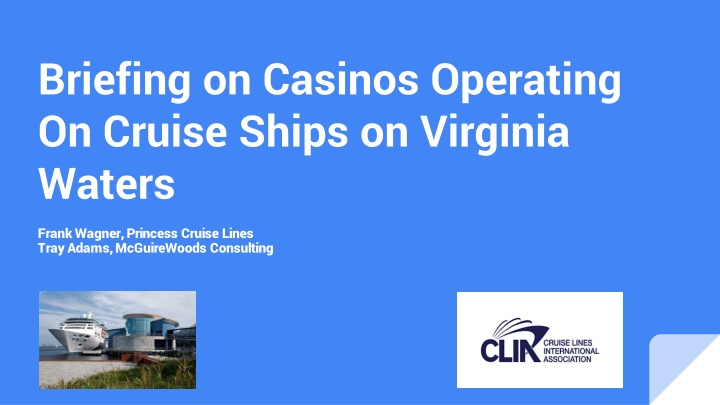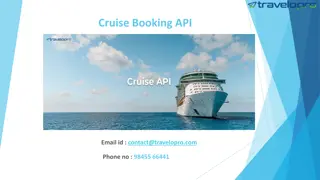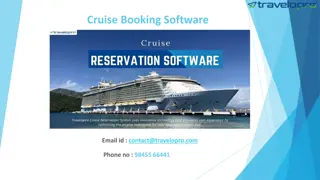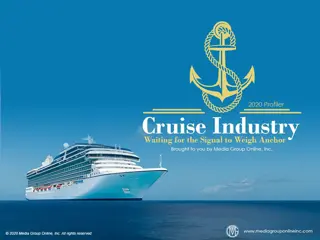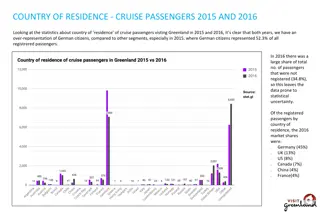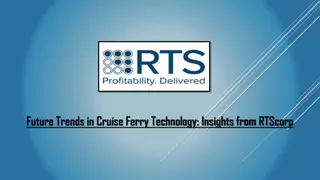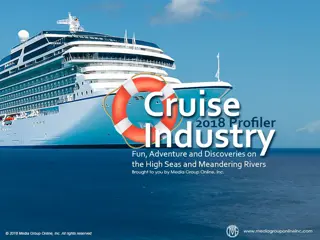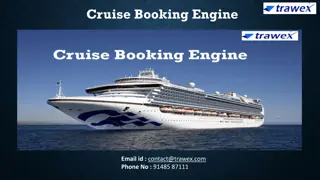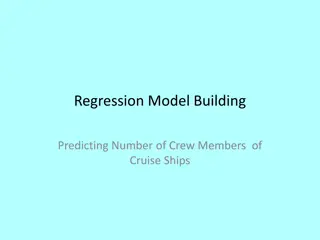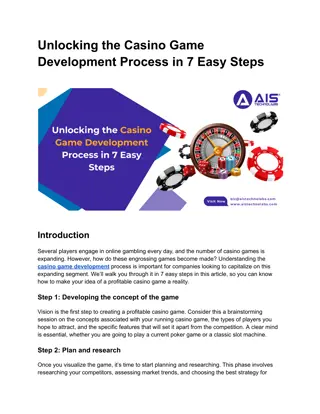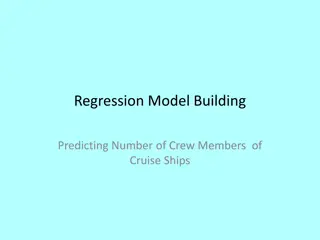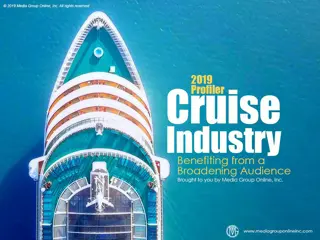Casino Operations on Cruise Ships in Virginia
Virginia's waters see an increasing number of cruise ships with major lines like Carnival, Norwegian, Royal Caribbean, and Princess visiting Norfolk. These cruise lines adhere to strict regulations set by the Cruise Line International Association (CLIA) to ensure a safe and enjoyable gambling experience for passengers. Casino rules on board are in line with established gambling jurisdictions, and strict surveillance measures are in place to maintain fairness. Passengers have the right to opt-out of gambling activities if desired.
Download Presentation

Please find below an Image/Link to download the presentation.
The content on the website is provided AS IS for your information and personal use only. It may not be sold, licensed, or shared on other websites without obtaining consent from the author.If you encounter any issues during the download, it is possible that the publisher has removed the file from their server.
You are allowed to download the files provided on this website for personal or commercial use, subject to the condition that they are used lawfully. All files are the property of their respective owners.
The content on the website is provided AS IS for your information and personal use only. It may not be sold, licensed, or shared on other websites without obtaining consent from the author.
E N D
Presentation Transcript
Briefing on Casinos Operating On Cruise Ships on Virginia Waters Frank Wagner, Princess Cruise Lines Tray Adams, McGuireWoods Consulting
Cruise Line Activity In Virginia: A Brief History Starting about 20 years ago, Carnival cruise line started making ports of call in Norfolk. In 2020, Carnival signed a five year contract to homeport a ship in Norfolk with a three year option. Other cruise lines including Norwegian Cruise Line, Royal Caribbean Cruise Line, and Princess Cruise Line have docked in Norfolk. Cruise schedules for 2025 are estimated to bring 100,000 cruise passengers into Norfolk. Passangers are expected to spend nearly $15 million within Virginia's economy.
Cruise Line International Association (CLIA) CLIA is the most recognizable trade association for the cruise industry. The internationally accredited association represents 50 cruise lines and 95% of total global cruise capacity. CLIA is dedicated to the promotion of a safe and secure environment. Membership in CLIA requires each cruise line to adopt guidelines across a broad array of shipboard practices including casinos. Members must meet or exceed guidelines for their casino operations, as a requirement of membership.
CLIA Casino Rules and Regulations Rules of Play Each cruise line will set forth rules of play that follow established casino rules in Nevada, New Jersey, or England. Established Virginia casino rules are very similar to Nevada's rules today. Shipboard casino rules are available to any passengers onboard the ship. All gambling passengers must be 18 years or older. All cruise ships must provide an opt out for cruise passengers. The passenger only needs to notify the casino manager, casino host or cashier (similar to the Virginia lottery) to opt them out of participation in gaming. All shipboard gambling operations are inspected by each member line through its internal audit department on a regular basis.
CLIA Casino Rules and Regulations Rules of Play cont. All shipboard casinos have detailed internal control procedures. Including cash and coin counts, casino cage procedures, and other processes (Similar to licensed jurisdictions). CLIA policy states that some form of surveillance to assure fair and equitable operations for all parties. Carnival and its subsidiaries insure that all tables and the cashier cage are monitored by remote cameras. This TV feed is monitored shipboard and at a remote location. It should be noted that states (Alaska and Hawaii) who regulate shipboard casino operation and tax profits, do not require any charges to shipboard casino operations, rules or audits.
Passenger Rights CLIA s policy is that onboard casino operations are the overall responsibility of the hotel manager. If there is a gambling dispute that cannot be resolved by the casino manager, the passenger can bring the dispute to the hotel manager. If the dispute can not be resolved on board the vessel, the passenger can pursue the dispute with the cruise lines home office. The casino cage is required to keep a current list of contact information for the home office and make it available to any passenger. Gambling is strictly for the entertainment of the passengers who choose to avail themselves of this form of entertainment. CLIA policy also requires every ship to provide an opt out program for passengers who believe they may have a gambling problem.
IRS Compliance All cruise lines are required to report, and in certain instances, withhold taxes on behalf of the International Revenue Sources. Every cruise line withholds taxes on behalf of the IRS (Tax withholding will be applied at the IRS approved gambling withholding rate) when the amount won exceeds $5,000. W2-G s are required to be completed on behalf of all U.S. citizens and U.S. permanent residents who: The cruise line must file an IRS form 1099 in instances of giveaways exceeding $600 when there is no wager or entry fee. Win over $1200 on slot machines or bingo Earn poker wins over $5,000 A Currency Transaction Report (CTR) must be filed pertinent to currency transactions over $10,000. Win greater than $600 and less than $5,000 on any other table game or lotto
Action In Other States Tax vs Fee Maryland uses form and fee for casino license. Alaska and Hawaii regulate and tax Cruise ships in these states operate in state waters for nearly their entire cruise. Although shipboard casinos are monitored and regulated by the states, these same states have accepted CLIA s guidelines as implemented by each cruise line as sufficient to provide accurate accounting for tax purposes. Other states Ports of call in other states are so close to international waters that the need for a casino license in alleviated. From Norfolk to the Virginia limit is 30 miles, approximately a 4 hour sailing time. Cruise lines would like to open their casinos after the ship is underway but while still transiting in Virginia waters.
Tax or fee? During the last legislative session, some legislators discussed whether to tax the operation or charge a fee as a condition of a license. Alaska and Hawaii chose to monitor and tax shipboard casinos In those states, cruise ships operate exclusively or nearly entirely in state waters for the duration of the cruise. Maryland opted for an application and fee due to the short time the ship operates in state waters. Virginia is similar to Maryland in that transit times to international waters are approximately four hours If Virginia opted for Alaska s tax structure, taxes collected would likely not cover the cost to monitor and audit. This would also likely create logistical challenges.
Summary CLIA member cruise lines have all adopted rules and regulations that comply with either Nevada, New Jersey, or England casino rules and regulations. Systems are audited and the CEO of each cruise line certifies annually that the cruise line is in full compliance with all casino guidelines. Passengers have a clear path to resolve any disputes. All casino operations are monitored by cameras both on the ship and at a remote on-shore location.
